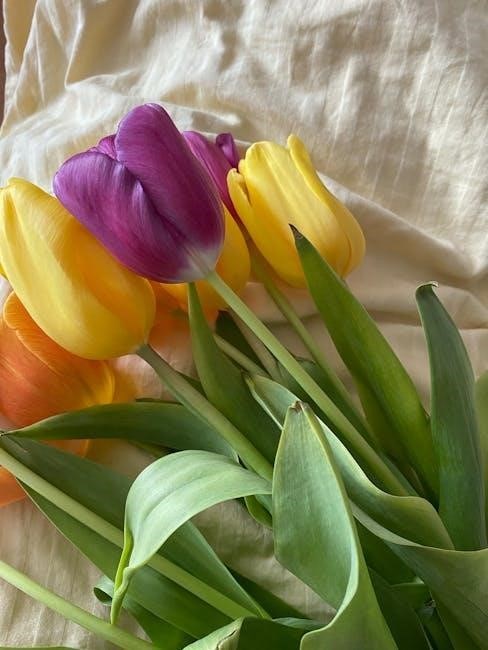Title
Monsieur Ibrahim et les Fleurs du Coran PDF: A Heartwarming Tale of Friendship and Spiritual Growth Between a Jewish Boy and a Muslim Grocer in 1960s Paris.
Monsieur Ibrahim et les Fleurs du Coran PDF: A Tale of Friendship and Spiritual Growth
Set in 1960s Paris, this novel by Éric-Emmanuel Schmitt tells the heartwarming story of Momo, a lonely Jewish boy, and Monsieur Ibrahim, a wise Muslim grocer. Their unlikely friendship transcends cultural and religious boundaries, exploring themes of spirituality, identity, and belonging. Inspired by the Quran’s teachings, the story follows their journey of mutual growth and understanding, capturing the essence of compassion and interfaith connection in a diverse world.
Éric-Emmanuel Schmitt, a Belgian writer, crafted this poignant tale, blending spirituality and interfaith dialogue, showcasing his ability to explore deep themes through heartfelt narratives.
Author Background
Éric-Emmanuel Schmitt: The Visionary Behind the Story
Éric-Emmanuel Schmitt, a Belgian writer, crafted this poignant tale, blending spirituality and interfaith dialogue. His works often explore themes of identity, faith, and human connection. Inspired by personal experiences and philosophical inquiries, Schmitt’s narratives are both deeply emotional and intellectually stimulating. This approach has made him a celebrated author, known for his ability to create stories that resonate profoundly across cultures and generations.

Plot Summary
The story follows Momo, a lonely Jewish boy, and Monsieur Ibrahim, a wise Muslim grocer, as they form an unlikely bond in 1960s Paris. Their friendship blossoms through shared adventures, exploring themes of spirituality, identity, and belonging. Momo’s life transforms under Ibrahim’s guidance, leading to a heartwarming journey of self-discovery and mutual understanding.
The Journey of Momo and Monsieur Ibrahim in 1960s Paris
In 1960s Paris, Momo, a lonely Jewish boy, forms an unexpected bond with Monsieur Ibrahim, a wise Muslim grocer. Their friendship blossoms as Ibrahim shares teachings from the Quran, offering Momo guidance and comfort. Momo’s life, marked by a neglectful father and a longing for connection, transforms under Ibrahim’s mentorship. Together, they embark on a journey of mutual discovery, exploring themes of spirituality, identity, and belonging in a diverse world. Their relationship transcends cultural and religious boundaries, fostering a deep and enduring connection.
Key Characters
Momo, a young Jewish boy, finds solace in Monsieur Ibrahim, a wise Muslim grocer. Their friendship transcends cultural boundaries, fostering spiritual growth and mutual understanding in 1960s Paris.
Momo: The Lonely Jewish Boy
Momo, a 13-year-old Jewish boy, lives in 1960s Paris with his emotionally distant father. Feeling isolated and neglected, he finds comfort in the wisdom and kindness of Monsieur Ibrahim, a Muslim grocer. Their bond helps Momo navigate his loneliness, uncovering a sense of belonging and identity. Ibrahim’s teachings from the Quran inspire Momo’s spiritual growth, transforming him from a lost child to a young man with purpose and understanding.
Monsieur Ibrahim: The Wise Muslim Grocer
Monsieur Ibrahim, a kind-hearted Muslim grocer, becomes a fatherly figure to Momo. Originating from the Golden Crescent, he imparts wisdom and compassion, teaching Momo about the Quran’s flowers, symbolizing spiritual growth. His deep understanding and gentle guidance help Momo find purpose and belonging, transforming their friendship into a journey of mutual respect and enlightenment.
Themes
The novel explores themes of friendship across generations and cultures, spiritual growth through Quranic teachings, and identity in a diverse world, emphasizing compassion and wisdom.
Friendship Across Generations and Cultures
Momo, a lonely Jewish boy, and Monsieur Ibrahim, a wise Muslim grocer, form an unlikely bond in 1960s Paris. Their friendship transcends age, religion, and cultural differences, fostering mutual respect and understanding. Through their interactions, the novel highlights the power of human connection to overcome societal divides, emphasizing the beauty of interfaith relationships and the universal values of kindness and compassion that unite people across generations.
Spirituality and the Teachings of the Quran
Monsieur Ibrahim introduces Momo to the spiritual wisdom of the Quran, sharing its teachings on love, compassion, and self-discovery. Through their conversations, Momo finds solace and guidance, learning to navigate life’s challenges with a deeper sense of purpose. The Quran’s lessons become a source of strength for Momo, bridging cultural and religious gaps while fostering a profound connection between the two characters.
Identity and Belonging in a Diverse World
Monsieur Ibrahim et les Fleurs du Coran explores themes of identity and belonging through Momo’s journey. As a Jewish boy in a diverse Parisian neighborhood, Momo struggles with his sense of self until Monsieur Ibrahim, a Muslim grocer, offers guidance. Their bond transcends cultural and religious differences, showing how shared humanity can create a sense of belonging. The story highlights the beauty of embracing multiple identities in a diverse world.

Cultural and Religious Context
The story is set in 1960s Paris, exploring the cultural and religious harmony between a Jewish boy and a Muslim grocer, with the Quran’s teachings central to their bond and highlighting the beauty of interfaith connections.
The Jewish and Muslim Heritage in Paris
The novel beautifully portrays the Jewish and Muslim heritage in 1960s Paris, highlighting the cultural and religious coexistence in the city. Momo, a Jewish boy, and Monsieur Ibrahim, a Muslim grocer, form a bond that transcends their religious identities, showing how shared humanity bridges divides. The story reflects the diverse fabric of Paris, where both communities thrive, enriching each other through their traditions and values.
The Significance of the Quran in the Story
The Quran plays a central role in Monsieur Ibrahim’s teachings, symbolizing spiritual wisdom and guidance. Through its verses, Ibrahim imparts life lessons to Momo, blending Islamic philosophy with universal values of love and compassion; The “flowers of the Quran” metaphorically represent the beauty and growth of the soul, emphasizing the text’s transformative power. This sacred book bridges cultural divides, fostering understanding and unity between Momo and Ibrahim, despite their religious differences.
Philosophical Elements
Monsieur Ibrahim shares life lessons, emphasizing love, compassion, and self-discovery. His teachings highlight the importance of human connections and spiritual growth, illustrating wisdom and grace.
Life Lessons from Monsieur Ibrahim
Monsieur Ibrahim imparts timeless wisdom, teaching Momo about love, compassion, and self-discovery. His lessons transcend cultural and religious boundaries, emphasizing the importance of human connection and spiritual growth. Through his guidance, Momo learns to embrace life’s challenges and find meaning in relationships. Ibrahim’s philosophy, rooted in kindness and tolerance, inspires Momo to grow beyond his circumstances, illustrating the transformative power of wisdom and grace.
The Concept of Love and Compassion
Monsieur Ibrahim embodies love and compassion, offering Momo comfort and wisdom during difficult times. His actions transcend cultural and religious boundaries, showing that true love and compassion are universal. Through Ibrahim’s guidance, Momo learns to embrace these values, leading to personal growth and healing. The story highlights how love and compassion can bridge divides and transform lives, leaving a lasting impact on those who experience them.
Film Adaptation
The 2003 film adaptation, directed by François Dupeyron and starring Omar Sharif, beautifully captures the essence of the novel, bringing Momo and Monsieur Ibrahim’s story to life on screen.
From Book to Screen: The 2003 Movie
The 2003 film adaptation, directed by François Dupeyron, stars Omar Sharif as Monsieur Ibrahim and Pierre Boulanger as Momo. The movie faithfully captures the novel’s essence, exploring themes of friendship, spirituality, and identity. Sharif’s performance earned critical acclaim, bringing depth to the wise grocer’s character. The film remains a poignant reflection of interfaith connections, staying true to Éric-Emmanuel Schmitt’s original story while offering a visual journey of Momo’s transformative experience.
Omar Sharif as Monsieur Ibrahim
Omar Sharif brings Monsieur Ibrahim to life with remarkable depth and warmth, capturing the essence of the wise and compassionate grocer. His nuanced portrayal earned critical acclaim, highlighting the character’s spiritual wisdom and gentle guidance of Momo. Sharif’s performance in the 2003 film adaptation remains iconic, embodying the heart and soul of Éric-Emmanuel Schmitt’s story, and cementing his legacy in this unforgettable role.

Symbolism in the Story
The flowers of the Quran symbolize spiritual growth and enlightenment, while the journey represents self-discovery and the quest for meaning in a diverse and interconnected world.
The Flowers of the Quran: A Symbol of Growth
The flowers of the Quran represent spiritual growth and enlightenment, symbolizing Momo’s journey from loneliness to understanding. Monsieur Ibrahim teaches Momo that these flowers embody the beauty and wisdom of the Quran, guiding him toward self-discovery and compassion. Their growth mirrors Momo’s transformation, illustrating how faith and friendship can blossom even in challenging circumstances, offering hope and renewal.
The Journey as a Metaphor for Self-Discovery
Momo’s journey with Monsieur Ibrahim serves as a metaphor for self-discovery, transcending physical travel. Their travels across France symbolize Momo’s transition from adolescence to adulthood, exploring identity, faith, and belonging. The journey mirrors his internal growth, guided by Ibrahim’s wisdom, allowing him to embrace his heritage and find purpose. This transformative experience reflects the universal quest for meaning and the power of mentorship in shaping one’s path.
Legacy and Impact
Monsieur Ibrahim et les Fleurs du Coran has become a critically acclaimed and beloved novel, celebrated for its profound exploration of interfaith dialogue and timeless themes.
The Book’s Reception and Popularity
Monsieur Ibrahim et les Fleurs du Coran has garnered widespread acclaim for its poignant portrayal of friendship and spirituality. Readers worldwide have praised its emotional depth and universal themes. The novel’s success led to a celebrated film adaptation, further cementing its place in contemporary literature. Its ability to foster interfaith dialogue has made it a cherished read, resonating with audiences across cultures and generations.
Its Influence on Interfaith Dialogue
Monsieur Ibrahim et les Fleurs du Coran has become a powerful tool for fostering interfaith understanding. By exploring the bond between a Jewish boy and a Muslim grocer, the novel transcends religious boundaries, promoting empathy and mutual respect. Its universal message of love and compassion has inspired readers to embrace diversity, making it a significant contribution to global interfaith dialogue and cultural exchange.
Monsieur Ibrahim et les Fleurs du Coran leaves a timeless message of friendship, spirituality, and interfaith harmony, inspiring readers to embrace diversity and find common ground.
The Timeless Message of Monsieur Ibrahim et les Fleurs du Coran
Monsieur Ibrahim et les Fleurs du Coran delivers a universal message of friendship, spirituality, and self-discovery, transcending cultural and religious boundaries. The story highlights the transformative power of love and compassion, as Momo and Monsieur Ibrahim navigate life’s challenges together. Their bond exemplifies the beauty of interfaith harmony, offering timeless lessons on identity, belonging, and the pursuit of happiness in a diverse world.
